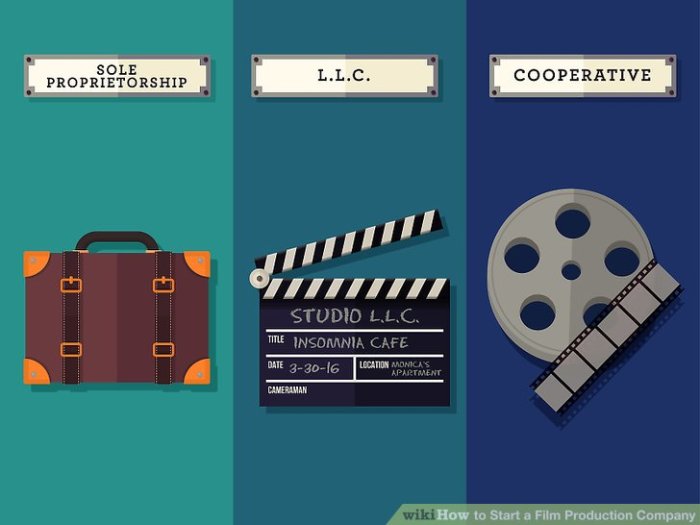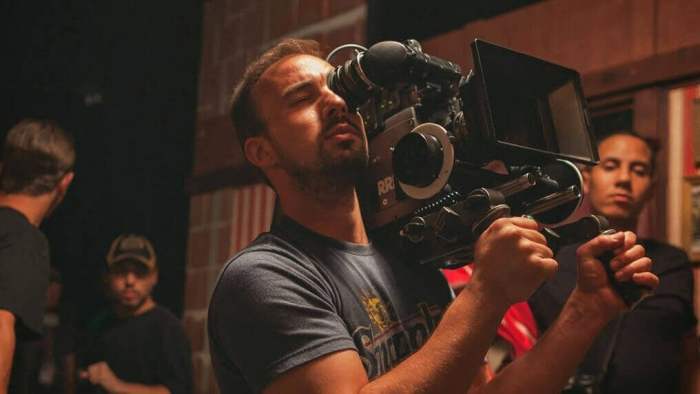How to get into movie production lays out a roadmap for aspiring filmmakers, guiding them through the essential steps to embark on a rewarding career in this dynamic industry. This guide explores the key elements needed for success, from entry-level roles and portfolio building to networking, education, and essential skills development.
The journey into movie production is paved with opportunities for growth and learning. This comprehensive guide will provide valuable insights into various aspects of the industry, from navigating job applications to maintaining professionalism and staying updated with the latest trends. By understanding the intricacies of each stage, readers can confidently navigate the path toward a successful career in movie production.
Entry-Level Roles: How To Get Into Movie Production

Breaking into the film industry often begins with entry-level positions. These roles provide valuable experience and a foundation for future career growth. Understanding the responsibilities, required skills, and potential salary expectations of these roles is crucial for aspiring filmmakers. A solid understanding of the various entry-level positions can help aspiring filmmakers craft a focused and effective career path.
Entry-Level Positions in Movie Production
A range of entry-level positions exist within the movie production pipeline. These positions often involve assisting more experienced crew members, providing crucial support to the production team, and gaining hands-on experience in the filmmaking process.
- Production Assistant (PA): PAs are the backbone of any production. They handle a wide array of tasks, from running errands and scheduling meetings to managing paperwork and assisting other crew members. A PA’s responsibilities vary greatly depending on the size and type of production. Often, this is a first step into the industry, providing a broad overview of the entire process.
This role typically requires strong organizational skills, attention to detail, and a willingness to learn. Strong communication skills are also important for effective collaboration. A high school diploma or equivalent is usually sufficient, but a college degree or relevant coursework in film, business, or communications can be beneficial.
- Grip Assistant: Grips assist the head grip in setting up and maintaining camera equipment. This includes moving and securing equipment, and ensuring safety on set. Strong physical stamina and the ability to work in demanding conditions are key. A high school diploma or equivalent, with an interest in technical aspects of filmmaking, is usually required. Practical experience is valued, so any prior experience with technical equipment or problem-solving is advantageous.
- Electrician Assistant: Electricians’ assistants support the head electrician in setting up and maintaining lighting equipment. This involves cable management, ensuring proper electrical safety, and assisting with the set’s lighting design. A high school diploma or equivalent is usually sufficient, but experience with electrical tools and systems is a plus. A desire to learn and understanding of basic electrical principles are also important.
- Sound Assistant: Sound assistants support the sound department by operating equipment, recording sound effects, and assisting with sound mixing. They also maintain the sound equipment. A high school diploma or equivalent is usually sufficient, but experience with audio equipment or coursework in audio technology is highly valuable. A good ear for sound and attention to detail are essential.
- Camera Assistant: Camera assistants support the camera crew by setting up and maintaining camera equipment, focusing the camera lens, and assisting with camera movements. A high school diploma or equivalent is usually sufficient. Familiarity with camera operation, a good understanding of technical aspects, and physical stamina are all crucial.
Example Job Descriptions
“Seeking a highly motivated and detail-oriented Production Assistant to join our team for an upcoming film shoot. Responsibilities include scheduling, running errands, and providing support to the production team. Candidates with experience in a fast-paced environment are preferred.”
“We are looking for a Camera Assistant to join our crew for a documentary project. The ideal candidate will have experience operating camera equipment and a strong understanding of camera techniques. A high school diploma is required.”
Salary Expectations and Career Progression
| Role | Typical Salary Range (USD) | Typical Career Progression |
|---|---|---|
| Production Assistant | $20,000 – $35,000 per year | Production Coordinator, Assistant Director, Production Manager |
| Grip Assistant | $22,000 – $38,000 per year | Grip, Gaffer |
| Electrician Assistant | $25,000 – $40,000 per year | Electrician, Lighting Technician |
| Sound Assistant | $20,000 – $30,000 per year | Sound Technician, Sound Mixer |
| Camera Assistant | $20,000 – $35,000 per year | Camera Operator, Camera Department Head |
Salary ranges are estimates and can vary based on location, experience, and the specific production.
Building a Portfolio
A strong portfolio is crucial for aspiring movie production professionals. It serves as a tangible demonstration of your skills, experience, and potential to prospective employers. A well-crafted portfolio showcases your abilities and differentiates you from other candidates, ultimately increasing your chances of securing a position. It’s not just a collection of projects; it’s a compelling narrative of your journey and capabilities within the industry.Creating a portfolio that effectively communicates your skills and experience requires careful consideration and strategic presentation.
A portfolio should not only highlight your accomplishments but also clearly demonstrate your understanding of the filmmaking process, from pre-production to post-production. It should be a reflection of your creative vision, technical proficiency, and dedication to the craft.
Importance of a Portfolio
A portfolio is more than just a collection of projects; it’s a curated showcase of your abilities and potential. It allows potential employers to assess your practical skills, your understanding of filmmaking principles, and your capacity to contribute to a production team. A well-constructed portfolio demonstrates your commitment to the industry, highlighting your adaptability and creativity. A portfolio allows potential employers to see firsthand the quality of your work and understand your creative vision.
Types of Projects for a Portfolio
A diverse range of projects demonstrates a broad skillset and adaptability. A portfolio should showcase your abilities across various aspects of movie production. Including a variety of projects – from short films to music videos – provides a comprehensive overview of your skills and experience.
Examples of Projects for Different Roles
To illustrate the type of projects suitable for various production roles, here are some examples:
- Short Films: Short films are excellent for demonstrating your ability to manage a project from start to finish, encompassing all stages of production. They allow you to showcase your storytelling abilities, technical proficiency, and collaboration skills. These projects are valuable for demonstrating your overall production knowledge, from pre-production planning to post-production editing and sound design. A well-made short film will illustrate your understanding of the entire filmmaking process.
- Music Videos: Music videos showcase your visual storytelling and ability to work within a creative brief. They highlight your understanding of visual aesthetics, editing techniques, and collaboration with other creative professionals, such as musicians and choreographers. This type of project is great for demonstrating your ability to interpret a brief, manage tight deadlines, and work with a diverse team.
- Student Projects: Student projects, especially those with significant creative contributions, can showcase your practical experience and understanding of filmmaking principles. This type of project often demonstrates your ability to follow instructions and contribute to a team environment. Student films frequently display your understanding of the artistic and technical aspects of movie production.
Structure of a Strong Portfolio
A well-organized portfolio is essential for effectively communicating your skills and experience. The structure should be clear, concise, and easy to navigate. This table Artikels the essential sections and provides examples of content for each:
| Portfolio Section | Content Examples |
|---|---|
| About Me | Brief professional summary, filmmaking philosophy, relevant experience (e.g., internships, volunteer work), and a statement highlighting your passion for filmmaking. |
| Short Films/Projects | Detailed descriptions of your projects, including the role you played, a link to view the project (if available), a description of your responsibilities (e.g., director, editor, cinematographer), and any accolades or recognition received. |
| Skills | List of technical and creative skills, with brief descriptions of your proficiency level. This includes software proficiency (e.g., Adobe Premiere Pro, Final Cut Pro), camera operation, lighting techniques, and sound design. |
| Awards/Recognition | List of awards or recognitions received for your work (e.g., film festival awards, scholarships). |
| Contact Information | Professional email address, phone number, and social media links (if relevant and professional). |
Networking and Connections
Building a strong network is crucial for navigating the competitive movie production industry. Connections open doors to opportunities, provide valuable insights, and can even lead to mentorship and collaboration. Cultivating relationships with professionals in the field is not just about collecting business cards; it’s about fostering genuine relationships based on mutual respect and shared goals.Networking in film production is more than simply attending events.
It’s about actively engaging with individuals, learning from their experiences, and demonstrating genuine interest in their work. This proactive approach builds rapport and strengthens connections, leading to greater opportunities down the line.
Significance of Networking
Networking in film production is essential for accessing opportunities and advancing your career. Connections provide access to industry knowledge, potential projects, and mentorship. A strong network can be the difference between being overlooked and receiving opportunities. Experienced professionals often have a vast network of contacts who can provide valuable insights and recommendations.
Methods for Connecting with Professionals
Building relationships with professionals in the field requires a strategic approach. Attend industry events, join professional organizations, and engage in online communities. Participating in workshops and seminars allows you to connect with like-minded individuals and learn from experienced professionals. Building genuine connections involves actively listening, asking thoughtful questions, and sharing your knowledge and experiences.
Networking Events and Platforms
Numerous events and platforms facilitate networking in the movie production industry. Film festivals, industry conferences, and workshops provide opportunities to meet professionals, learn about current trends, and build connections. Online platforms like LinkedIn and industry-specific forums offer avenues to connect with potential mentors, collaborators, and employers. Networking events often feature panel discussions, Q&A sessions, and networking receptions, offering opportunities to interact with industry leaders.
Leveraging Your Network for Opportunities
Once you’ve established a network, proactively leverage it to gain access to opportunities. Reach out to contacts for informational interviews, seeking advice and insights into the industry. Showcase your skills and portfolio to your network, highlighting your strengths and aspirations. Networking is a two-way street. Be ready to offer your support and expertise to others within your network.
Potential Contacts and Expertise
| Contact | Area of Expertise |
|---|---|
| Film Producer | Project development, securing funding, and managing production budgets |
| Casting Director | Talent scouting, auditions, and selecting actors for roles |
| Director of Photography | Visual storytelling through cinematography |
| Production Designer | Creating the aesthetic and visual environment of a film |
| Editor | Assembling footage into a cohesive narrative |
| Sound Designer | Creating and mixing sound effects and music |
| Screenwriter | Developing and writing screenplays |
Education and Training

Embarking on a career in movie production often necessitates a blend of formal education, practical experience, and continuous learning. A strong foundation in the fundamentals of filmmaking, coupled with specialized training, can significantly enhance your prospects. This section explores diverse educational pathways and highlights the value of continuous learning.A well-rounded educational approach, encompassing theoretical understanding and practical application, is crucial for aspiring filmmakers.
Whether you choose formal degree programs, specialized certifications, or online resources, dedication to learning and refining your skills will be essential.
Different Educational Paths
Various educational paths can lead to a career in movie production. These include degree programs in film, television, or media production, which provide a comprehensive understanding of the entire filmmaking process. Associate’s and Bachelor’s degrees are commonly pursued, offering a structured curriculum. Specialized programs focusing on cinematography, sound design, or editing are also available.
Value of Relevant Certifications and Courses
Certifications and specialized courses can complement formal education or serve as stand-alone training. These courses often delve into specific aspects of filmmaking, such as camera operation, lighting techniques, or post-production software. They can provide practical skills and knowledge in a focused manner, making you more attractive to potential employers. The value of a certification or course depends on its relevance to the specific area of production you aim to enter.
Online Resources for Learning
Numerous online platforms offer valuable resources for learning about movie production. Websites and online courses provide a flexible and accessible way to acquire new skills. This learning approach is particularly advantageous for individuals seeking to supplement their existing knowledge or explore specific areas of interest.
Examples of Online Courses and Workshops
Several reputable online platforms offer courses and workshops covering various aspects of movie production. These resources may include specialized courses on cinematography, editing software, or scriptwriting. Some examples of platforms include Coursera, Udemy, and Skillshare. They often feature instructors with industry experience, making the learning process more effective.
Comparing Educational Programs and Potential Career Outcomes, How to get into movie production
| Educational Program | Potential Career Outcomes | Typical Duration |
|---|---|---|
| Associate’s Degree in Film Production | Entry-level roles like assistant editor, production assistant, or camera operator. | 2 years |
| Bachelor’s Degree in Film Studies | More advanced roles such as production coordinator, or script supervisor. | 4 years |
| Master’s Degree in Film Production | Opportunities for roles like director of photography, or producer. | 2-3 years |
| Specialized Certification in Cinematography | Camera operator, assistant director of photography | Variable, depending on the certification |
Note: Career outcomes are not guaranteed and depend on individual skills, experience, and networking efforts. The duration of programs may vary depending on the institution and specific program.
Essential Skills
Stepping into the movie production world requires a diverse skill set, encompassing both technical proficiency and interpersonal abilities. A solid foundation in these areas is crucial for navigating the challenges and opportunities that arise throughout the production process. Understanding and developing these skills empowers aspiring professionals to contribute effectively and contribute to successful projects.
Technical Skills
A strong grasp of technical skills is fundamental for any role in movie production. These skills allow individuals to contribute efficiently and effectively to the creative process. From scriptwriting to cinematography and sound design, proficiency in each area is essential.
- Scriptwriting: The ability to craft compelling narratives, engaging dialogues, and detailed character descriptions is vital for scriptwriters. Developing this skill requires practice, feedback from experienced writers, and immersion in various storytelling techniques. Examples include understanding different genres and exploring different narrative structures. Practice writing short scripts and seeking feedback on their strengths and weaknesses. Researching different screenwriting styles and techniques is a crucial step in improving this skill.
- Cinematography: Cinematographers must understand camera angles, lighting techniques, and composition to create visually compelling scenes. Learning to use professional cameras, practicing with different lighting setups, and studying the work of renowned cinematographers can significantly enhance this skill. Mastering various camera movements and understanding the impact of color palettes on the mood of a scene are key elements of this skill.
- Sound Design: Sound designers play a critical role in creating immersive audio experiences. They must understand how to record, mix, and manipulate sound effects, dialogue, and music to enhance the narrative. Developing this skill involves studying sound mixing techniques, experimenting with different sound effects, and learning about the importance of sound design in storytelling.
- Editing: Editors are responsible for assembling footage and creating a cohesive narrative. Developing this skill requires learning editing software, practicing different editing styles, and understanding the importance of pacing and rhythm in a film. Studying the work of renowned editors and analyzing how they achieve specific effects can greatly improve this skill.
Soft Skills
Beyond technical skills, soft skills are equally crucial for success in the movie industry. These skills foster collaboration, communication, and adaptability, which are vital for navigating the often-complex and fast-paced environment.
- Communication: Clear and effective communication is essential for conveying ideas, receiving feedback, and collaborating with team members. Practicing active listening, presenting ideas clearly, and giving constructive feedback are key elements of developing this skill. Enhancing communication involves actively seeking out opportunities to interact with professionals in the industry and engaging in constructive conversations.
- Collaboration: The ability to work effectively with others, respect diverse viewpoints, and resolve conflicts is critical in a collaborative environment like film production. Practicing teamwork, engaging in group projects, and understanding different communication styles can greatly enhance this skill. Learning how to delegate tasks and work collaboratively on projects is vital in developing this skill.
- Time Management: The ability to manage time effectively is crucial for meeting deadlines and staying organized throughout the production process. Developing time management skills involves creating schedules, prioritizing tasks, and setting realistic goals. Understanding how to prioritize tasks and allocate time effectively is essential to succeeding in this aspect.
- Problem-Solving: Unforeseen challenges are common in film production. Developing strong problem-solving skills is crucial for finding solutions, adapting to changing circumstances, and maintaining a positive attitude. This skill is developed through practice, learning from mistakes, and seeking guidance from experienced professionals.
Skill Development Resources
The following table offers resources for enhancing the technical and soft skills discussed:
| Skill Category | Specific Skill | Resources for Improvement |
|---|---|---|
| Technical Skills | Scriptwriting | Online screenwriting courses, workshops, mentorship from established writers |
| Technical Skills | Cinematography | Online cinematography courses, workshops, practical experience filming various scenes |
| Technical Skills | Sound Design | Online sound design courses, workshops, practical experience in recording and mixing audio |
| Technical Skills | Editing | Online editing software tutorials, editing courses, practice editing various footage |
| Soft Skills | Communication | Public speaking workshops, participating in group discussions, networking events |
| Soft Skills | Collaboration | Group projects, volunteer work, working with diverse teams |
| Soft Skills | Time Management | Time management techniques workshops, project management software, setting realistic deadlines |
| Soft Skills | Problem-Solving | Case studies, problem-solving workshops, seeking advice from experienced professionals |
Finding Opportunities

Securing a position in the film industry requires proactive searching and strategic application. Identifying suitable opportunities and tailoring your application materials are crucial steps in the process. Understanding the various avenues for finding openings and effectively presenting your qualifications significantly increases your chances of success.
Identifying Job Openings
Locating potential employment in film production necessitates a multifaceted approach. Beyond traditional job boards, networking within the industry and utilizing industry-specific publications are vital. Prospective employers often post openings on specialized platforms, and keeping abreast of these resources is essential.
Tailoring Your Resume and Cover Letter
A crucial aspect of successful job applications is tailoring your resume and cover letter to each specific role. Generic applications often fall short, whereas tailored applications showcase a deep understanding of the position and demonstrate your alignment with the employer’s needs. Each application should highlight relevant skills and experiences that directly address the job description. By demonstrating a clear understanding of the role’s requirements, you showcase your suitability.
Examples of Effective Job Applications
A compelling resume and cover letter are essential for attracting the attention of recruiters. Tailoring these documents to specific roles is paramount. For instance, a resume for a camera operator position should prominently feature experience in cinematography and equipment operation. The cover letter should explicitly connect your skills to the specific needs of the role, demonstrating your passion and understanding of the requirements.
Examples of effective applications demonstrate a candidate’s thorough understanding of the position and their ability to articulate their skills in a concise and impactful manner.
Reaching Out to Potential Employers
Networking and proactively reaching out to potential employers is a key component in securing a position. Building relationships with industry professionals and showcasing your passion for film production can open doors to opportunities. Actively engaging with industry professionals through networking events and online platforms can lead to valuable connections. Demonstrating initiative and enthusiasm through thoughtful outreach can significantly impact your prospects.
Monitoring Job Boards and Industry Publications
Staying updated on available positions is critical for career advancement. Regularly checking relevant job boards and industry publications can yield promising opportunities. By actively monitoring these resources, you can identify openings aligned with your skills and experience.
| Job Board/Publication | Description |
|---|---|
| Backstage | A comprehensive platform offering roles in theater, film, and television. |
| Casting Networks | Specialized platform for actors and other creative personnel. |
| Film Independent | Provides industry news, resources, and job listings for aspiring filmmakers. |
| The Hollywood Reporter | A leading industry publication covering a wide range of entertainment news, including job listings. |
| Variety | A prominent entertainment publication with detailed coverage of film and television, including job openings. |
Internships and Entry-Level Positions

Stepping into the film industry often requires a practical foundation. Internships and entry-level positions offer invaluable experience and provide a direct pathway to professional growth. They are an excellent way to gain firsthand knowledge of the industry’s workings, build a network of contacts, and gain a competitive edge in a highly competitive field.
Benefits of Internships in Movie Production
Internships provide a unique opportunity to gain hands-on experience in various aspects of movie production. This experience allows aspiring professionals to apply theoretical knowledge to practical situations, developing crucial skills and understanding the industry’s dynamics. Internships provide a direct connection to professionals, allowing for mentorship and guidance, crucial for navigating the intricacies of the film industry. Furthermore, internships frequently lead to full-time employment opportunities, demonstrating the value placed on interns by production companies.
Finding and Securing Internships
Finding suitable internships requires proactive research and a well-defined approach. Online job boards, production company websites, and networking events are key resources for discovering potential opportunities. Tailoring your resume and cover letter to highlight relevant skills and experience is crucial for showcasing your suitability to potential employers. Networking with industry professionals, through attending film festivals, workshops, and industry events, can lead to unexpected opportunities.
Demonstrating enthusiasm and initiative during the application process is also key.
Examples of Successful Internship Programs
Numerous film production companies and studios offer structured internship programs. These programs often provide comprehensive training and mentorship, offering structured learning pathways for interns. The programs provide valuable experience in various departments, allowing interns to explore different aspects of movie production. For example, some companies offer specialized internships focusing on specific areas like cinematography, editing, or sound design.
Building Relationships with Mentors and Supervisors
Developing strong relationships with mentors and supervisors during an internship is crucial. Mentors can provide invaluable guidance, support, and feedback, contributing significantly to an intern’s professional development. Proactively seeking guidance and feedback from supervisors demonstrates initiative and a desire to learn. Active participation in meetings, constructive communication, and a willingness to take on new challenges contribute to positive relationships.
Building strong relationships with mentors and supervisors can pave the way for future opportunities and career advancement.
Comparing Internship Opportunities
| Internship Opportunity | Department | Potential Benefits |
|---|---|---|
| Assistant Editor Internship at a Feature Film Production Company | Post-Production | Gain practical experience in editing software, develop organizational skills, learn project management techniques, and build relationships with editors. |
| Production Assistant Internship at an Independent Film Production Company | Production | Develop fundamental skills in production logistics, learn about scheduling and budgeting, and gain experience working with diverse teams. |
| Camera Assistant Internship at a Documentary Film Production Company | Camera | Learn camera operation techniques, gain knowledge of lighting and composition, and develop a keen eye for visual storytelling. |
| Sound Design Internship at a VFX Studio | Sound Design/Post-Production | Develop proficiency in sound editing, learn about sound design techniques, and gain experience in creating immersive audio environments. |
Maintaining Professionalism

A professional attitude and image are paramount in the film industry. This encompasses more than just polished attire; it involves consistent respectful behavior, clear communication, and a proactive approach to handling challenges. Cultivating a professional demeanor sets you apart and fosters positive relationships with colleagues and potential employers.Professionalism in film production extends beyond individual conduct; it reflects a commitment to excellence, integrity, and a shared vision for the project.
This includes understanding the importance of adhering to deadlines, maintaining confidentiality, and displaying respect for everyone involved in the creative process.
Importance of a Professional Attitude and Image
A professional attitude and image are crucial for navigating the competitive film industry. A positive and respectful demeanor builds trust and credibility with colleagues, clients, and potential employers. Dressing appropriately for meetings and on set, demonstrating punctuality, and actively listening to others are all essential components of projecting a professional image. A professional image also encompasses digital presence; maintaining a respectful and relevant online persona is just as important as in-person interactions.
Handling Criticism and Feedback Constructively
Constructive criticism is an invaluable tool for growth in any field, especially in film production. It’s essential to approach feedback with an open mind and a willingness to learn. Actively listen to the feedback, ask clarifying questions if needed, and seek to understand the perspective of the person offering the critique. A good response demonstrates a willingness to improve and a commitment to the project’s success.
For example, if a director suggests a change to a scene, consider the reasons behind the suggestion, and discuss potential solutions rather than becoming defensive.
Effective Communication Skills in a Production Environment
Effective communication is the lifeblood of any film production. Clear, concise, and respectful communication fosters collaboration, minimizes misunderstandings, and ensures everyone is on the same page. This includes active listening, clear articulation of ideas, and the ability to adapt communication styles to different personalities and situations. A production team needs a unified communication approach to efficiently and effectively complete a project.
Navigating Challenging Situations Professionally
Film productions often involve unexpected challenges, from scheduling conflicts to disagreements among team members. Maintaining professionalism during these times is critical. Remain calm, address the issue directly and respectfully, and strive to find a mutually agreeable solution. Focus on finding solutions rather than assigning blame. If a disagreement arises, try to understand the other person’s perspective and look for common ground.
Appropriate Professional Etiquette and Conduct
Professional etiquette encompasses a wide range of behaviors, including respecting others’ time, being punctual, maintaining confidentiality, and acknowledging the contributions of all team members. Respectful communication and behavior are crucial to maintaining a productive and harmonious work environment. This includes being mindful of your tone and language, avoiding gossip, and always treating others with courtesy. A professional environment fosters collaboration and respect for all individuals involved.
Staying Updated
Staying current with the ever-evolving movie production landscape is crucial for success. The industry is dynamic, with new technologies, techniques, and trends emerging constantly. Adaptability and a willingness to learn are essential for navigating this constantly shifting environment.
Importance of Industry Knowledge
Continuous learning and staying informed about industry trends are paramount for professional growth in film production. Keeping abreast of new technologies, evolving filmmaking styles, and changing audience preferences allows professionals to adapt their skills and strategies effectively. This proactive approach positions individuals for greater opportunities and better job performance.
Resources for Staying Informed
To maintain a strong understanding of industry developments, utilize a variety of resources. These range from established publications to online communities and social media.
Industry Publications, Blogs, and Social Media
A variety of resources offer valuable insights into the film production industry. Recognized industry publications, such as Variety, The Hollywood Reporter, and Filmmaker Magazine, provide comprehensive coverage of news, trends, and analysis. Specialized blogs and websites focus on specific areas of filmmaking, such as cinematography, sound design, or visual effects. Engaging with relevant social media platforms allows for interaction with industry professionals, discussions on current projects, and access to news updates.
Stay active on platforms like Twitter, LinkedIn, and Facebook to engage in relevant conversations.
Continuous Learning in Professional Development
Continuous learning is a fundamental aspect of professional development in the film industry. This involves actively seeking out opportunities to expand knowledge and skills. Attending workshops, seminars, and conferences provides practical experience and networking opportunities. Online courses and educational platforms offer flexible and accessible ways to learn new techniques and technologies.
Online Resources and Publications
Several online platforms and publications facilitate staying updated. Websites like Vimeo and YouTube offer a wealth of educational content, showcasing new techniques and providing insights into successful projects. Online courses from platforms such as Coursera, Udemy, and Skillshare offer specialized training in various aspects of filmmaking. Industry-specific forums and online communities allow professionals to connect and share knowledge.
Publications like American Cinematographer, and Motion Picture Sound, provide deep dives into the technical and creative aspects of the industry. Also, consider checking resources from film schools and universities for updated information.
Final Conclusion
In conclusion, entering the movie production world requires a multifaceted approach. This guide has highlighted the critical elements needed for success, from building a strong portfolio to establishing professional networks and acquiring essential skills. By diligently pursuing these steps, aspiring filmmakers can position themselves for a rewarding career within the vibrant and dynamic movie production industry.
Common Queries
What are some common entry-level roles in movie production?
Entry-level roles often include assistant director, production assistant, runner, grip, or camera assistant. Responsibilities vary but generally involve supporting the production team.
How can I build a strong portfolio without prior experience?
Create short films, music videos, or student projects showcasing your skills. Even small projects can demonstrate your abilities and commitment to the field.
What are some essential soft skills for movie production?
Essential soft skills include strong communication, teamwork, problem-solving, and time management. These are crucial for collaboration and effective project execution.
How do I find internships in movie production?
Network with professionals, research relevant production companies, and apply for internship opportunities. Actively seeking out internship programs is crucial.



